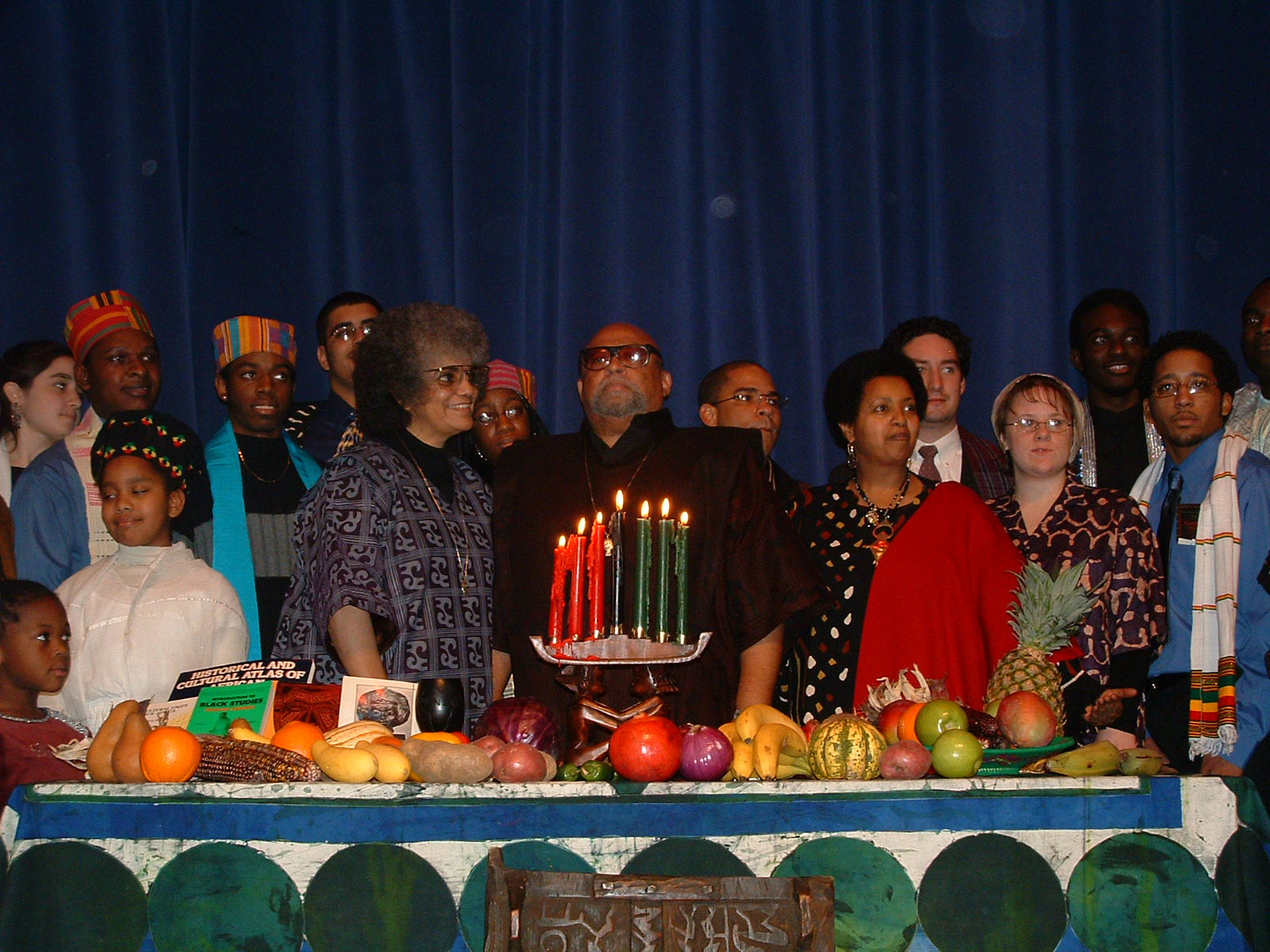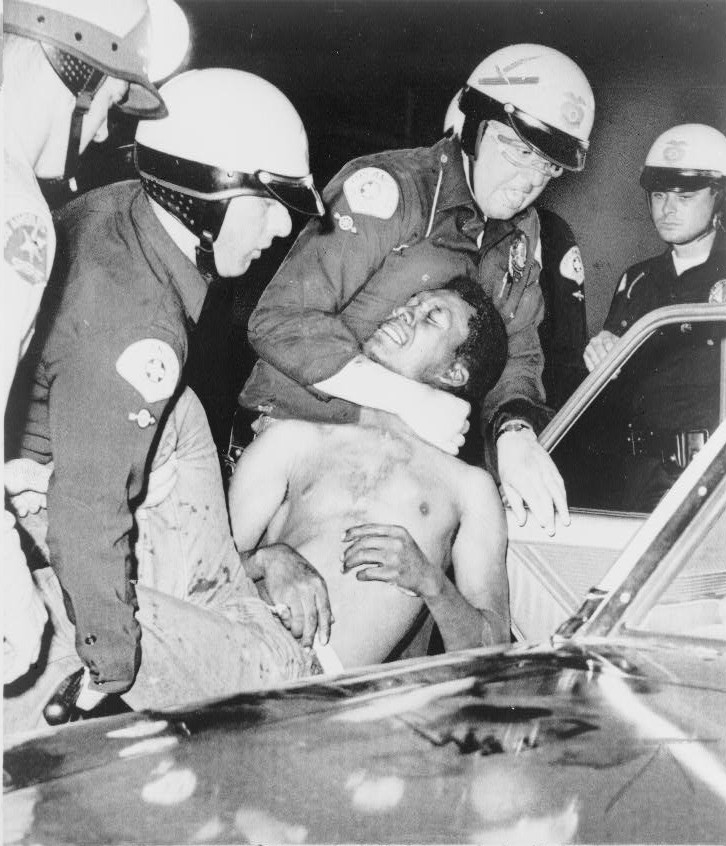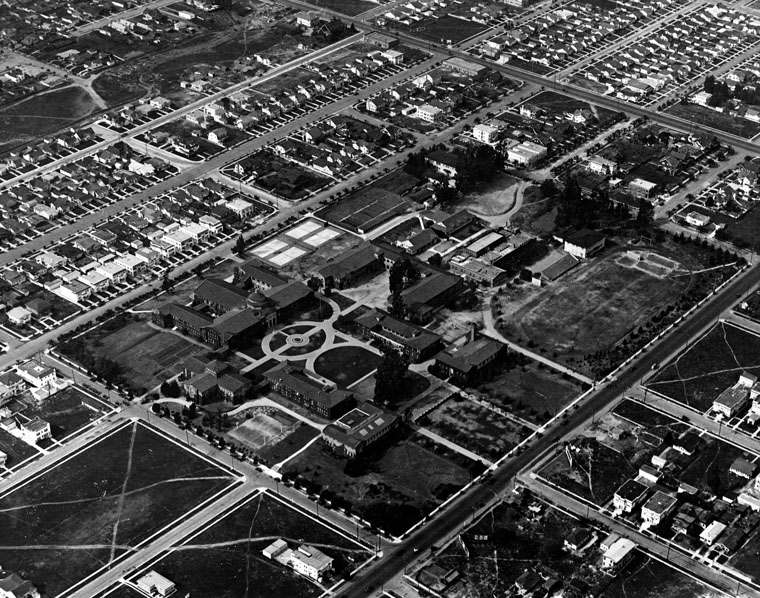|
L.A. Rebellion
The L.A. Rebellion film movement, sometimes referred to as the "Los Angeles School of Black Filmmakers", or the UCLA Rebellion, refers to the new generation of young African and African-American filmmakers who studied at the UCLA Film School in the late-1960s to the late-1980s and have created a black cinema that provides an alternative to classical Hollywood cinema. Background In June 1953, Ike Jones became the first African American to graduate from the UCLA Film School. In the next 15 years, the numbers of African-American filmmakers remained small. One of those was Vantile Whitfield, who founded the Performing Arts Society of Los Angeles in 1964 and received a master's degree at UCLA in 1967. By the late 1960s, in the midst of affirmative action, the number of black students steadily increased. Among this new crop of artists were Charles Burnett, an engineering student who had attended Los Angeles City College, and Haile Gerima, an Ethiopian filmmaker who had recently m ... [...More Info...] [...Related Items...] OR: [Wikipedia] [Google] [Baidu] |
Charles Burnett (director)
Charles Burnett (; born April 13, 1944) is an American film director, film producer, writer, editor, actor, photographer, and cinematographer. His most popular films include '' Killer of Sheep'' (1978), '' My Brother's Wedding'' (1983), '' To Sleep with Anger'' (1990), '' The Glass Shield'' (1994), and '' Namibia: The Struggle for Liberation'' (2007). He has also directed several short films and documentary films. Burnett has been named as "one of America's very best filmmakers" by the ''Chicago Tribune'' and "the nation's least-known great filmmaker and most gifted black director" by ''The New York Times''.A Film by Charles Burnett – Filmmaker ''Killer of Sheep''. Retrieved on 4 July 2011. He received an |
University Of California, Los Angeles
The University of California, Los Angeles (UCLA) is a public university, public Land-grant university, land-grant research university in Los Angeles, California, United States. Its academic roots were established in 1881 as a normal school then known as the southern branch of the California State Normal School which later evolved into San Jose State University, San José State University. The branch was transferred to the University of California to become the Southern Branch of the University of California in 1919, making it the second-oldest of the ten-campus University of California system after the University of California, Berkeley. UCLA offers 337 undergraduate and graduate degree programs in a range of disciplines, enrolling about 31,600 undergraduate and 14,300 graduate and professional students annually. It received 174,914 undergraduate applications for Fall 2022, including transfers, the most of any Higher education in the United States, university in the United Stat ... [...More Info...] [...Related Items...] OR: [Wikipedia] [Google] [Baidu] |
Clyde Taylor
Clyde Russell Taylor (July 3, 1931 – January 24, 2024) was an American film scholar, writer and cultural critic who made contributions to the fields of cinema studies and African American studies. He was an emeritus professor at New York University. His scholarship and commentary often focused on Black film and culture. Career Clyde Taylor wrote and published numerous scholarly articles, essays, and reviews. Taylor is best known for coining the term 'L.A. Rebellion', which refers to the group of African American filmmakers who emerged from the UCLA School of Theater, Film and Television in the 1970s. This movement was characterized by its emphasis on social realism and its rejection of Hollywood conventions. Clyde held faculty positions at UC Berkeley, Stanford University, and Mills College, then returned to Boston for a position in the Department of English at Tufts University. After over a decade at Tufts University, Taylor accepted a position at New York University. He rem ... [...More Info...] [...Related Items...] OR: [Wikipedia] [Google] [Baidu] |
Teshome Gabriel
Teshome H. Gabriel (September 24, 1939 – June 14, 2010) was an Ethiopian-born American cinema scholar and professor at the UCLA School of Theater, Film and Television in Los Angeles. Gabriel was considered an expert on cinema and film of Africa and the developing world. A colleague at UCLA, Vinay Lal, noted that Gabriel was "one of the first scholars to theorize in a critical fashion about Third World cinema." Gabriel was born in Ticho, Ethiopia, on September 24, 1939. He immigrated to the United States in 1962. He obtained a bachelor's degree in political science in 1967 and received a master's degree in educational media in 1969, both from the University of Utah. He continued his education at UCLA, where he earned a master's degree in theater arts in 1976 and a doctorate in film and television studies in 1979. Gabriel began lecturing at UCLA in 1974 and became an assistant professor at the UCLA School of Theater, Film and Television in 1981. Gabriel's books included ''Third C ... [...More Info...] [...Related Items...] OR: [Wikipedia] [Google] [Baidu] |
Ethnographic Film
An ethnographic film is a non-fiction film, often similar to a documentary film, historically shot by Western filmmakers and dealing with non-Western people, and sometimes associated with anthropology. Definitions of the term are not definitive. Some academics claim it is more documentary, less anthropology, while others think it rests somewhere between the fields of anthropology and documentary films. Anthropologist and ethnographic filmmaker David MacDougall wrote in a 1978 paper: "Ethnographic films cannot be said to constitute a genre, nor is ethnographic film-making a discipline with unified origins and an established methodology. Since the first conference on ethnographic film was held at the Musée de l'Homme 30 years ago, the term has served a largely emblematic function, giving a semblance of unity to extremely diverse efforts in the cinema and social sciences." The genre has its origins in the colonial context. Scholars and practitioners have put great efforts to disa ... [...More Info...] [...Related Items...] OR: [Wikipedia] [Google] [Baidu] |
Ron Karenga
Maulana Ndabezitha Karenga (born Ronald McKinley Everett, July 14, 1941), previously known as Ron Karenga, is an American activist, author and professor of Africana studies, best known as the creator of the pan-African and African-American holiday of Kwanzaa. Born in Parsonsburg, Maryland, to an African-American family, Karenga studied at Los Angeles City College and the University of California, Los Angeles. He was active in the Black Power movement of the 1960s, joining the Congress of Racial Equality and Student Nonviolent Coordinating Committee. In 1965, Karenga and Hakim Jamal co-founded the black nationalist group US Organization, which became involved in violent clashes with the Black Panther Party by 1969. In 1971, he was convicted of felony assault, torture, and false imprisonment of women. He denied involvement and claimed the prosecution was political in nature. Karenga was imprisoned in California Men's Colony until he received parole in 1975. In 1966, Karenga not ... [...More Info...] [...Related Items...] OR: [Wikipedia] [Google] [Baidu] |
Rebellion
Rebellion is an uprising that resists and is organized against one's government. A rebel is a person who engages in a rebellion. A rebel group is a consciously coordinated group that seeks to gain political control over an entire state or a portion of a state. A rebellion is often caused by political, religious, or social grievances that originate from a perceived inequality or marginalization. ''Rebellion'' comes from Latin ''re'' and ''bellum'', and in Lockian philosophy refers to the Right of revolution, responsibility of the people to overthrow unjust government. Classification Uprisings which revolt, Resistance movement, resisting and taking direct action against an authority, law or policy, as well as organize, are rebellions. An insurrection is an uprising to change the government. If a government does not recognize rebels as belligerents, then they are insurgents and the revolt is an insurgency. In a larger conflict, the rebels may be recognized as belligerents ... [...More Info...] [...Related Items...] OR: [Wikipedia] [Google] [Baidu] |
Watts Riots
The Watts riots, sometimes referred to as the Watts Rebellion or Watts Uprising, took place in the Watts neighborhood and its surrounding areas of Los Angeles from August 11 to 16, 1965. The riots were motivated by anger at the racist and abusive practices of the Los Angeles Police Department, as well as grievances over employment discrimination, residential segregation, and poverty in L.A. On August 11, 1965, Marquette Frye, a 21-year-old black man, was pulled over for drunk driving.Dawsey, Darrell (August 19, 1990)"To CHP Officer Who Sparked Riots, It Was Just Another Arrest" ''Los Angeles Times''. After he failed a field sobriety test, officers attempted to arrest him. Marquette resisted arrest, with assistance from his mother, Rena Frye; a physical confrontation ensued in which Marquette was struck in the face with a baton. Meanwhile, a crowd of onlookers had gathered. Rumors spread that the police had kicked a pregnant woman who was present at the scene. Six days of civ ... [...More Info...] [...Related Items...] OR: [Wikipedia] [Google] [Baidu] |
Cinema Of Africa
Cinema of Africa covers both the History of film, history and present of the Filmmaking, making or screening of films on the African continent, and also refers to the persons involved in this form of audiovisual culture. It dates back to the early 20th century, when film reels were the primary cinematic technology in use. As there are more than 50 countries with audiovisual traditions, there is no one single 'African cinema'. Both historically and culturally, there are major regional differences between North African and Sub-Saharan Africa, sub-Saharan cinemas, and between the cinemas of different countries.Hayward, Susan. "Third World Cinemas: African Continent" in ''Cinema Studies: The Key Concepts'' (Third Edition). Routledge, 2006. p. 426-442 The cinema of Egypt and the cinema of Tunisia are among the oldest in the world. Cinema of Egypt in particular is the most established and flourishing industry in Africa. Pioneers Auguste and Louis Lumière screened their films in Alexan ... [...More Info...] [...Related Items...] OR: [Wikipedia] [Google] [Baidu] |
Los Angeles City College
Los Angeles City College (LACC) is a public community college in East Hollywood, California. A part of the Los Angeles Community College District, it is located on Vermont Avenue south of Santa Monica Boulevard on the former campus of the University of California, Los Angeles (UCLA). From 1947 to 1955, the college shared its campus with California State University, Los Angeles (Cal State LA), then known as Los Angeles State College of Applied Arts and Sciences (LASCAAS), before the university moved to its present campus of in the northeastern section of the City of Los Angeles, east of the Civic Center. History The LACC campus was originally a farm outside Los Angeles, owned by Dennis Sullivan. It is one of nine separate college campuses of the Los Angeles Community College District. When the Pacific Electric Interurban Railroad connected downtown Los Angeles and Hollywood in 1909, the area began to develop rapidly. In 1914, the LA Board of Education moved the teach ... [...More Info...] [...Related Items...] OR: [Wikipedia] [Google] [Baidu] |
Affirmative Action
Affirmative action (also sometimes called reservations, alternative access, positive discrimination or positive action in various countries' laws and policies) refers to a set of policies and practices within a government or organization seeking to address systemic discrimination. Historically and internationally, support for affirmative action has been justified by the idea that it may help with bridging inequalities in employment and pay, increasing access to education, and promoting diversity, social equity, and social inclusion and redressing wrongs, harms, or hindrances, also called substantive equality. The nature of affirmative-action policies varies from region to region and exists on a spectrum from a hard quota to merely targeting encouragement for increased participation. Some countries use a quota system, reserving a certain percentage of government jobs, political positions, and school vacancies for members of a certain group; an example of this is the reservati ... [...More Info...] [...Related Items...] OR: [Wikipedia] [Google] [Baidu] |
Vantile Whitfield
Vantile Emmanuel Whitfield (September 8, 1930 – January 9, 2005), was an arts administrator who helped found several performing arts institutions in the United States. Background Born September 08, 1930 in Washington, D.C, well known as Vantile Emmanuel Whitfield, but also known as Motojicho was then an only child between Theodore Roosevelt Whitfield and Lugene Ellen Green. Throughout Whitfield's adolescence a direct path had been taken for him to gain much success for himself Vantile, in years to come becomes a student at Dunbar High School, and quite active in playing football while congruently gaining a deep interest in painting. But, after high school, whitfield served in the Air Force until 1952. When, in 1957, Whitfield received a Bachelors of Arts degree, he became one of the first African Americans to study theatre at Howard Unversity. Once Whitfield received his studies and graduated from Howard University, He enrolled in the master's degree program at the ... [...More Info...] [...Related Items...] OR: [Wikipedia] [Google] [Baidu] |





